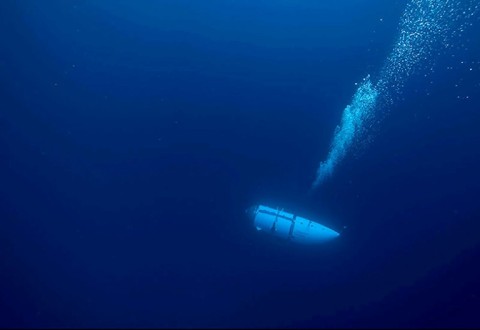
NORTH ATLANTIC OCEAN - A multinational mission to find a missing submersible near the Titanic wreck is still focused on rescuing the five-member crew alive, the US coast guard insisted Thursday, despite fears that the vessel's oxygen may already have run out.
Two more unmanned subs were deployed Thursday as the massive hunt for the Titan, lost somewhere in a vast swathe of the North Atlantic between the ocean's surface and more than nearly four kilometers below, moved to the critical stage.
Based on the sub's capacity to hold up to 96 hours of emergency air, rescuers had estimated that the passengers could run out of oxygen in the early hours of Thursday.
But as that possible deadline passed US Coast Guard Rear Admiral John Mauger said rescuers were "fully committed."
"People's will to live really needs to be accounted for as well. And so we're continuing to search and proceed with rescue efforts," he told NBC's Today show.
A surge of assets and experts have joined the operation in the past day, and sonar has picked up unidentified underwater noises.
Organizers of the multinational response -- which includes US and Canadian military planes, coast guard ships and teleguided robots -- are focusing their efforts in the North Atlantic close to the underwater noises detected by sonar.
The French research ship Atalante deployed an unmanned robot able to search at depths of up to 6,000 meters (nearly 20,000 feet) below water earlier Thursday, the Coast Guard tweeted. Experts have called the Victor 6000 "the main hope" for an underwater rescue.
The Canadian vessel Horizon Arctic has also deployed a robot that has already reached the ocean floor and begun its search, the Coast Guard also said in a tweet.

Mauger has also said that vessels carrying medical staff and a decompression chamber are en route to the area.
The sounds raised hopes that the passengers on the small tourist craft are still alive, though experts have not been able to confirm their source.
"We don't know what they are, to be frank with you," said US Coast Guard Captain Jamie Frederick.
"We have to remain optimistic and hopeful."
The submersible, named Titan, began its descent at 8:00 am on Sunday and had been due to resurface seven hours later, according to the US Coast Guard.

The 6.5-meter tourist craft lost communication with its mothership less than two hours into its trip to see the Titanic, which sits more than nearly four kilometers below the surface of the North Atlantic.
Titan was carrying British billionaire Hamish Harding and Pakistani tycoon Shahzada Dawood and his son Suleman, who also have British citizenship.
OceanGate Expeditions charges $250,000 for a seat on the sub.
- 'Mr Titanic' -
Also on board is the company's CEO, Stockton Rush, and a French submarine operator Paul-Henri Nargeolet, nicknamed "Mr Titanic" for his frequent dives at the site.
Ships and planes have scoured 10,000 square miles (around 20,000 square kilometers) of surface water -- roughly the size of the US state of Massachusetts -- for the vessel, which attempted to dive about 400 miles off the coast of Newfoundland, Canada.
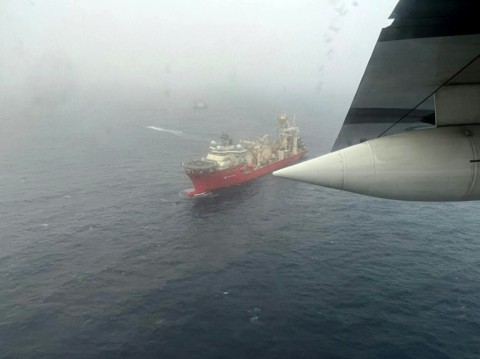
After the noises were detected by a Canadian P-3 aircraft, rescuers relocated two remotely operated vehicles (ROV) that search under the water and one surface vessel with sonar capability.
The ROV searches have not yielded results but data from the Canadian aircraft has been shared with US Navy experts for acoustics analysis.
The Navy has sent a specialized winch system for lifting heavy objects from extreme depths along with other equipment and personnel, while the Pentagon has deployed three C-130 aircraft and three C-17s.
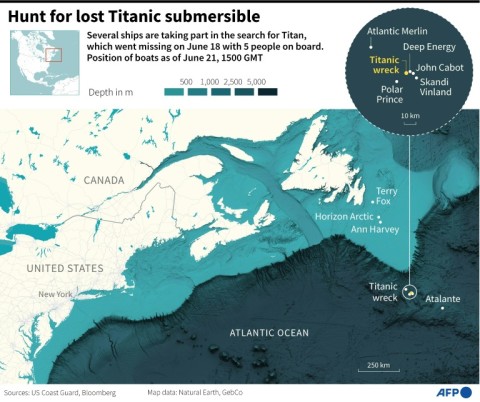
The Titanic hit an iceberg and sank in 1912 during its maiden voyage from England to New York with 2,224 passengers and crew on board. More than 1,500 people died.
It was found in 1985 and remains a lure for nautical experts and underwater tourists.
The pressure at that depth as measured in atmospheres is 400 times what it is at sea level.
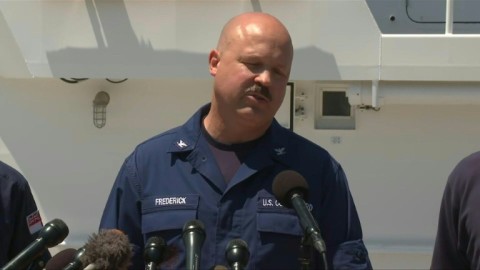
- Inside the sub -
Tom Zaller, who runs the company behind "Titanic: The Exhibition," toured the wreck 23 years ago in a submersible much like the one that went missing Sunday.
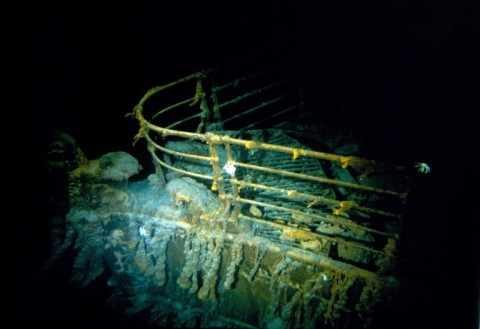
"You're sending a very small vessel two and a half miles down, which is incredibly complicated and technical," he said.
"It's just this very seemingly unsophisticated sphere."
Zaller has known Nargeolet for decades and was in touch with Rush before he embarked on Sunday's tour.
"I was in that sub for 12 hours with everything working fine," Zaller said. "They've been there for almost four days. I just can't imagine."

